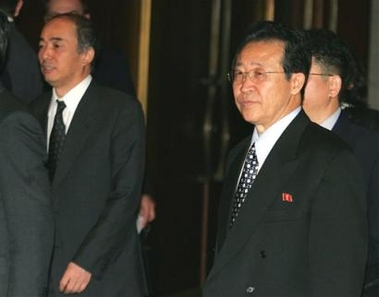|
North Korean nuclear talks resume in Beijing
(AFP)
Updated: 2005-11-09 11:11
Six-nation talks aimed at ending North Korea's nuclear program have resumed
in Beijing with delegates aiming to draw-up a roadmap on implementing a
disarmament deal brokered nearly two months ago.
Delegates from China, North Korea, South Korea, the United States, Russia and
Japan are scheduled to meet for three days in Beijing to put forward their
strategies, then return to the Chinese capital in December for further talks.
The talks began after the parties engaged in a series of bilateral meetings
during which delegations from the two Koreas met face-to-face, as well as those
from the United States and China.
The six nations agreed at the last round of talks in September to verifiably
scrap North Korea's nuclear programs in exchange for energy assistance and other
benefits.

Japanese lead negotiator Kenichiro Sasae,
left, and North Korean envoy, Kim Gye Gwan, right, walk into a meeting
room at the opening session of the fifth round of six party talks in
Beijing's Diaoyutai State Guesthouse Wednesday Nov. 9, 2005.
[AP] | But there have since been sharp differences on how to proceed towards the
final goal of disarmament. North Korea insists the United States must first
supply it with a light-water atomic reactor for energy.
The United States has said the light-water reactor must be a final step after
the North first rejoins the Nuclear Non-Proliferation Treaty (NPT) and accepts
inspections by the UN International Atomic Energy Agency (IAEA).
The United States' chief delegate, Christopher Hill, restated his nation's
position before the talks.
"It is very clear in the agreement what they need to do," Hill told
reporters.
"Our delegation made it very clear that first they have got to disarm and
create a nuclear-free Korean peninsula.
"And once they are back in the NPT, with IAEA safeguards and at an
appropriate time, we will have discussions about the subject of the provision of
a light-water nuclear reactor."
Japan has said it will put forward a "roadmap" to the other nations outlining
the steps it proposes all sides should take to achieve disarmament.
Japan's chief delegate to the talks, Kenichiro Sasae, presented his broad
strategy to his North Korean counterpart, Kim Gye-gwan, at a two-and-a-half-hour
bilateral meeting earlier.
"In the bilateral talks, the Japanese side stated its position that it wished
to discuss how we formulate a roadmap in implementing the joint statement," a
Japanese official said.
"The North Korean side said it is going to present its own view on that
matter."
Sasae said he came out of the meeting with Kim hopeful the North Koreans were
willing to make progress.
South Korea's chief delegate, Song Min-soon, expressed cautious optimism that
some progress would be achieved.
"After meeting with each side (in the bilateral meetings) I came to think
there is a way to reach an agreement on implementation plans even if it requires
endurance," Song told reporters.
North Korea has given little away publicly about its intentions, and adopted
an angry stance on the eve of the talks by claiming US President George W. Bush
had on this week's trip to Brazil slandered leader Kim Jong-Il.
"(Bush) malignantly slandered our supreme headquarters with such unspeakable
vituperation as 'tyrant' and the like," a foreign ministry spokesman said in a
statement carried by the North's official Korean Central News Agency.
Russia's Interfax news agency quoted a North Korean official as restating
Pyongyang's position that it wanted a nuclear reactor, diplomatic relations with
the United States and other assistance to coincide with it disarming.
The nuclear crisis flared up in October 2002 after the United States accused
North Korea of running a secret uranium-enrichment program.
The North responded by throwing out weapons inspectors and leaving the
NPT.
|